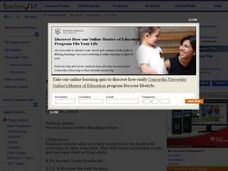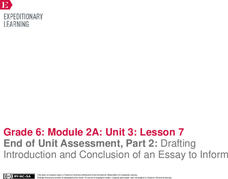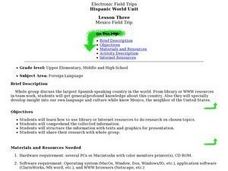Conneticut Department of Education
Instructional Strategies That Facilitate Learning Across Content Areas
Imagine 28 instructional strategies, appropriate for all subject areas and all grade levels. Directed Reading-Thinking Activities (DRTA), Question-Answer Relationship (QAR) activities, KWL charts, comparison matrixes, classification...
EngageNY
Synthesizing Research: How Colonists Were Interdependent
Following the formative assessment of this unit, young scholars present the information they gathered on their specific colonial trade to the rest of the class. Working in groups, learners create posters describing the particular job...
Curated OER
Starting an Elementary Book Club
Discover the benefits of starting a book club in this two-part article.
Syracuse City School District
Summary of Fiction and Non-Fiction Text
Somebody Wanted But So Then (SWBST)? Yes! Here's a great strategy for teaching young readers how to summarize narrative text. In addition, the packet includes exercises that show kids how to summarize nonfiction text using the classic...
Curated OER
Flat Stanley Guided Reading
Second graders listen to their teacher read the book, "Flat Stanley". They relate the activities in the book to activities in their own life. They can also create their own pictures of Stanley.
Curated OER
Guided Reading: Desert Life
First graders read a book with the teacher while encountering unfamiliar words and learning how to use context clues and visual clues to understand the material. For this reading comprehension lesson, 1st graders make predictions and...
Teaching Tolerance
Community Bulletin Board
A project-based lesson has pupils create a bulletin board to share artwork, nonfiction articles, and messages based on social justice themes. The finished board is displayed in the community to create a place for discussion.
Scholastic
Pilgrim and Wampanoag Daily Life
A lesson looks at the Pilgrims and Wampanoag tribe during the first Thanksgiving. Scholars compare and contrast information presented by an online activity then discuss their findings. Learners examine the two group's daily routines and...
Curated OER
Abigail as Letter Writer
The fourth instructional activity in the series of 16 asks researchers to analyze an exchange of letters between John and Abigail Adams for what they each valued in letter writing.
EngageNY
Main Ideas in Informational Text: Analyzing a Firsthand Human Rights Account for Connections to Specific Articles of the UDHR
Lesson 10 in a series of human rights lessons focuses on the skills of finding evidence and summarizing. Your young readers work to compare the two texts they have read in this unit: the Universal Declaration of Human Rights...
Houghton Mifflin Harcourt
One Land, Many Trails: Challenge Activities (Theme 5)
Bring history to life through literature. The first in a series of three challenge activities designed to accompany Theme 5: One Land, Many Trails does just that through unique projects connected to historical fiction and nonfiction...
American Press Institute
In the Newsroom: The Fairness Formula
Reporting the news is easy, right? Think again! Show young scholars the difficult choices journalists make every day through a lesson that includes reading, writing, and discussion elements. Individuals compare the language and sources...
Curated OER
Author's Purpose: Research Process/Narrative Writing Techniques
Determine the author's purpose in writing a memoir. Eighth graders work in groups to elicit author's purpose in memoirs, taking care to note how subtle the message can be hidden throughout the work. This lesson is a good way to...
K20 LEARN
Bear Tale: Author's Purpose - Informing Or Entertaining
After reading The Mitten by Jan Brett, scholars discuss the author's purpose. Small groups compare and contrast a book written to entertain and a book to inform, then create a T-Chart detailing the characteristics of each. Learners...
Curated OER
The Effects of Slavery
The emotional and spiritual oppression of slavery in the African-American experience is the focus of this lesson. Middle schoolers analyze various texts by Frederick Douglass and Maya Angelou related to freedom and oppression. They use...
Curated OER
Persona in Autobiography
A talkative old man? A naïve believer in Human Perfectibility? A Sage? Who is this guy, anyway? The Autobiography of Benjamin Franklin launches a study of the way Franklin uses structure, style, and purpose, as well as different...
Curated OER
Pumpkins
Observe the differences between the inside and outside of a pumpkin. Learners discuss what pumpkins are used for and then view a pumpkin. Next, they view the inside of the pumpkin and draw the differences they see.
BW Walch
Unexpected Family History
The history of the northern states' involvement in the slave trade is not widely known. This resource uses the PBS documentary, Traces of the Trade, and the nonfiction book, Children of the New England Slave Trade, to examine this aspect...
EngageNY
End of Unit Assessment, Part 2: Drafting Introduction and Conclusion of an Essay to Inform
A powerful introduction and conclusion can really pack a punch. Using the resource, scholars first read and discuss a model essay. Then, as part of the end of unit assessment, they draft the introductory and concluding paragraphs of...
Curated OER
Express Yourself Lesson Seed 3
If you're looking to set your class up for writing effective arguments, try out this idea. While originally created with freedom as a guiding idea, the activity could easily be adapted for other themes. As a class, create a chart of...
Curated OER
Mexico Field Trip
Explore how the library or Internet resources function as textual information. Young writers research a chosen topic then read and comprehend the collected information. They structure the information with texts and graphics for a...
Curated OER
Reading Through Rainforests
Learners investigate the concept of the rainforest through the use of nonfiction texts. The teacher reads to the class to give some information. Then they read their own books to find further information and perform the follow activities...
Curated OER
Genres, Genres Everywhere
Young readers assume the role of Genre Sleuths to investigate the characteristics of folktales, fantasies, and mysteries. For this session you will need to collect a variety of books on a topic you have been studying. Groups then examine...
Houghton Mifflin Harcourt
Nature: Friend and Foe: Challenge Activities (Theme 6)
The teacher doesn't always have to be the expert in the classroom. The first in a series of three supplementary activities Nature: Friend or Foe uses hands-on research tasks and projects to enhance readers' understanding of non-fiction...

























